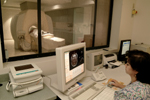Clinicians eye Maggie's capabilities
Affectionately known as "Big Maggie," MUSC's new Philips 3T magnetic resonance imaging (MRI) scanner provides crisper, more defined images. It is the only 3T scanner in South Carolina and one of three Phillips 3T scanners in the world. A grand opening ceremony for the new facility housing the scanner is being held today, Aug. 16. MRI
technician Linda Hamner reviews the scan of a patient's brain using the
Philips 3T magnetic resonance imaging (MRI) scanner. Located in the Clinical
Sciences Building's new first-floor MRI suite, it is one of three of its
kind in the world.
MRI
technician Linda Hamner reviews the scan of a patient's brain using the
Philips 3T magnetic resonance imaging (MRI) scanner. Located in the Clinical
Sciences Building's new first-floor MRI suite, it is one of three of its
kind in the world.
The 3T MRI scans can potentially be performed in half the time, with superior image quality, relative to those done with the 1.5T scanners now being used in most medical centers, according to Tara Noone, M.D., director of MR imaging. "We plan initially to use the machine for neurological applications, but we will soon expand applications to take full advantage of the machine's superior capabilities of diagnosing conditions on the whole body and, ultimately, guiding treatment procedures," Noone said.
The improvements in image quality give the machine the potential to replace invasive procedures. The 3T has the capability to diagnose a variety of tumors, and therefore could replace surgical or needle biopsies. In certain situations, it has the potential to be used in place of catheterizations, invasive procedures which detect narrowing or blockage of vessels, including the coronary arteries. The speed and design of the machine make it an ideal solution for:
- The child needing sedation for a scan, since longer sedation entails greater risk. The accommodating design puts children not requiring sedation at ease since they can see and interact with their parents and technicians in the scanning room.
- The patient with claustrophobic tendencies since the time in the machine can be greatly reduced. Additionally, the flared design of the machine makes it more comfortable for the claustrophobic patient.
- The patient requiring a procedure where he must hold his breath during the scan. This provides patients with lung disorders a diagnostic option they may not have had previously.
Although there was a $4 million cost for the scanner and its installation,
it is anticipated that clinical scans and funded research scans will generate
sufficient revenue for the machine to pay for itself within a few years.
But the expense to the patient or insurance company will be no different
from that of the older scanner. This is in part because the increased
speed of the scanner will result in the accommodation of more patients
in a given time period.
“This scanner will provide our patients with a technologically advanced diagnostic tool,” said MUSC President Ray Greenberg, M.D., PhD. He also noted that the 3T scanner would "help our researchers in their pioneering work on brain performance in health and illness. Dr. Mark George and his colleagues have conducted groundbreaking research, and the new machine will greatly advance their capabilities. This is a win-win situation—our patients will get the best possible care, and our scientists will get the best possible research tools." The 3,000 square-foot scanner suite is housed on the first floor of the Medical University's Clinical Sciences Building with its own entrance on Jonathan Lucas St. The machine was initially constructed in upstate New York and completed in the Netherlands. It was shipped to Charleston where a wall was temporarily removed from the Clinical Sciences Building to enable the machine to be brought in. Then walls were built around the machine. It is located close to the MUSC emergency room, enabling rapid evaluation of stroke and other conditions. ”
Catalyst Online is published weekly, updated as
needed and improved from time to time by the MUSC Office of Public Relations
for the faculty, employees and students of the Medical University of South
Carolina. Catalyst Online editor, Kim Draughn, can be reached at 792-4107
or by email, catalyst@musc.edu. Editorial copy can be submitted to Catalyst
Online and to The Catalyst in print by fax, 792-6723, or by email to petersnd@musc.edu
or catalyst@musc.edu. To place an ad in The Catalyst hardcopy, call Community
Press at 849-1778.